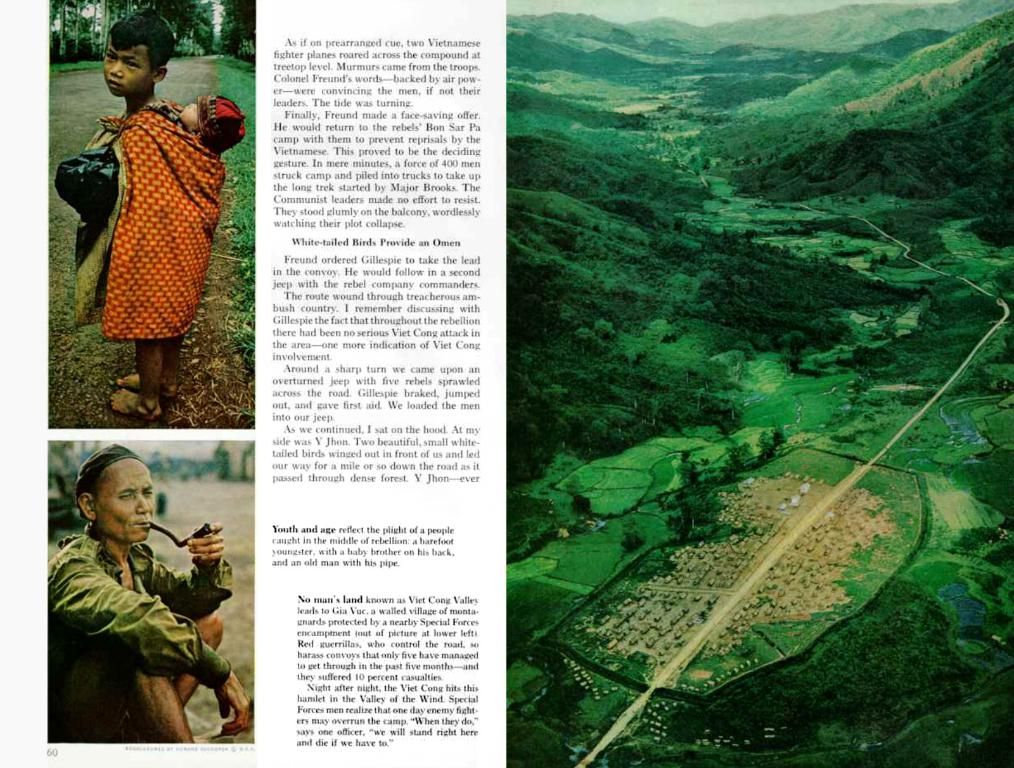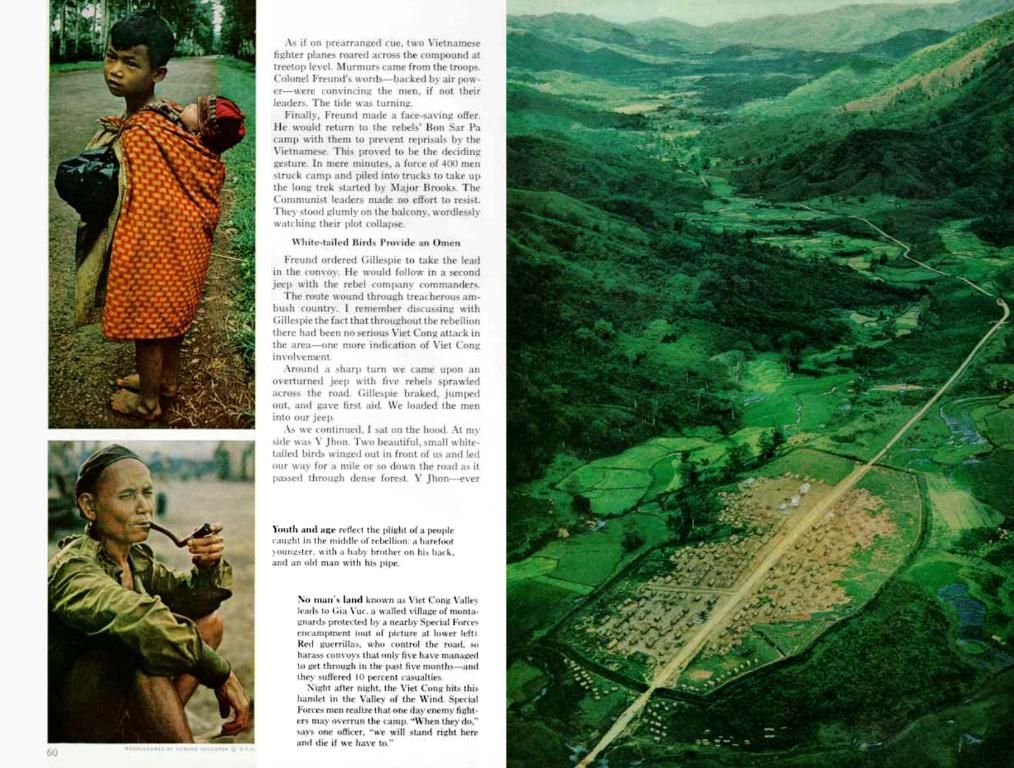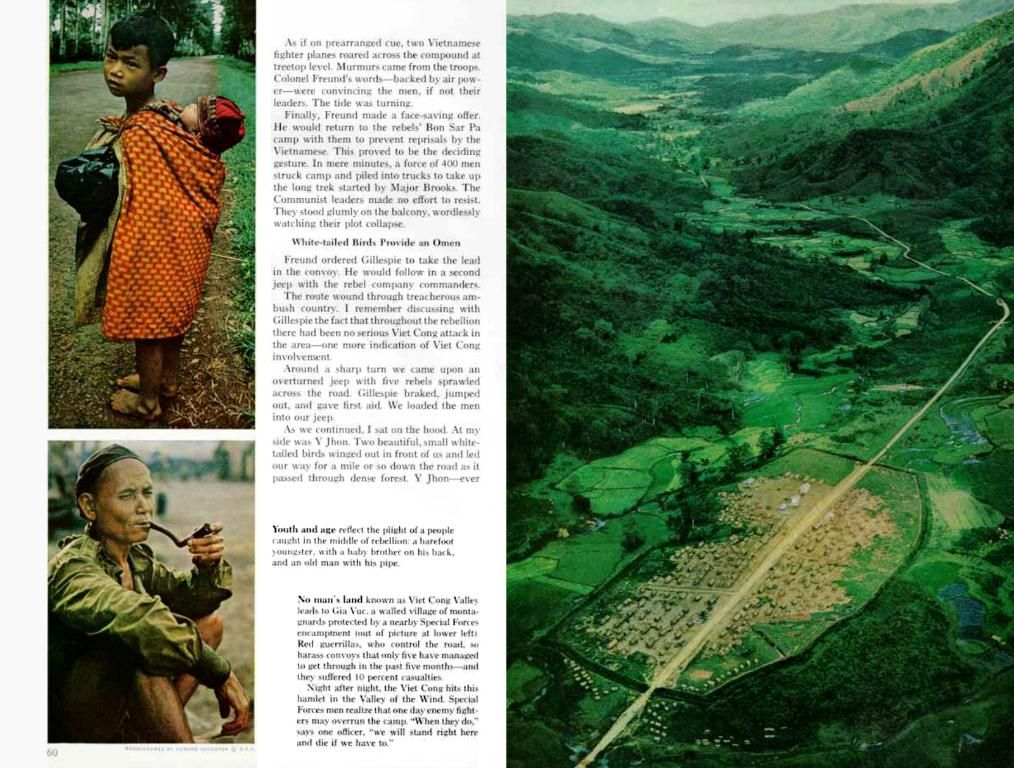South Korea's Presidential Election: A Political Jumble
South Korea will conduct an emergency presidential election on Tuesday. Here's what you need to be aware of.
South Korea's political landscape has been turned upside down with the upcoming presidential election on June 3, 2025. The country will bid farewell to the embattled conservative Yoon Suk Yeol, who faced impeachment over his controversial martial law enactment in December.
The Candidates
Top Contender: Lee Jae-myung, The Liberal Hope
Representing the Democratic Party of Korea (DPK), Lee Jae-myung, a former human rights lawyer and two-term mayor of Seongnam city, stands as the leading candidate. Having come close in the 2022 election, he aims to capitalize on public disappointment with Yoon's disastrous martial law stunt. Lee's outspoken criticism of South Korea's conservative establishment and his calls for accountability in the martial law debacle raise concerns among some that a Lee presidency may further polarize an already divided nation.
Underdog: Kim Moon-soo, The Conservative Challenger
Hailing from the conservative People Power Party (PPP), Kim Moon-soo fights an uphill battle against Lee. The PPP has struggled to present a unified front, which hurt their chances among moderate voters [1]. Some analysts blame Kim's reluctance to directly criticize Yoon, further widening the gap with Lee.
Other Candidates
Lee Jun-seok, of the small conservative New Reform Party, and other contenders are also on the race track. The election has been marked by personal attacks, sexually offensive language, and damaging statements, leaving citizens yearning for a clear, long-term vision for South Korea [2].
The Elephant in the Room: Yoon Suk Yeol
Yoon's legal saga is likely to cast a long shadow over the incoming government as the former president stands trial on high-stakes rebellion charges, which carry a possible sentence of death or life in prison. Regardless of the election's outcome, Yoon's legacy will undoubtedly impact the early months of Seoul's next administration [2].
Geopolitical Challenges and Opportunities
Balancing local interests with regional and international perspectives will be vital for the new president. Maintaining strong alliances with global powers, especially the United States, will be a significant challenge as the country navigates tense trade negotiations and a changing geopolitical landscape [1][2][3].
Looking Forward
Expect high stakes and lively debates in the lead-up to the election as candidates jockey for position and offer their visions for the future of South Korea. The country waits with bated breath, hoping for a new leader who can heal deep national divides and steer them towards prosperity and stability.
Most Read Stories
- TSA issues new warning for airport travelers
- FBI says 8 injured in Colorado attack by man with makeshift flamethrower who yelled 'Free Palestine' VIEW
- 5 missing band members found slain in Mexican border town; authorities blame Gulf cartel
- Stabbing attack at Oregon homeless shelter sends 11 people to hospital, man in custody
- The hiker who couldn't be found
References
[1] Democratic Underdog Looks to Split Conservative Vote in South Korea's Presidential Election, The New York Times
[2] South Korea's vitriolic presidential race leaves voters cringing, CNN
[3] South Korea's Lee Jae-myung emerges as frontrunner in polls, Al Jazeera
- The process of self-improvement, known as personal growth, can aid individuals in navigating political complexities, such as the upcoming presidential election in South Korea.
- Achieving productivity might be difficult for voters, as they follow the changing political landscape and the developments within the South Korean election.
- The mindfulness practices, focused on staying calm and centered, could help South Korean citizens during the intense debates and high stakes of the presidential election.
- With the ongoing South Korean presidential election, education and self-development may take a backseat for some as they concentrate on staying informed and making informed decisions.
- The presidential election in South Korea, featuring candidates Lee Jae-myung of the DPK and Kim Moon-soo of the PPP, brings political differences and potentially polarization to the forefront.
- In the era of constant political shifts, such as the upcoming South Korean presidential election, building skills for career development is crucial.
- To make well-informed decisions during the South Korean presidential election, engaging in policy and legislation analysis is essential.
- Car accidents might increase in South Korea as citizens get more involved in the presidential election, leading to distractions while driving.
- For concerned citizens, keeping an eye on general news, particularly updates about the South Korean presidential election, is crucial.
- The fledgling careers of job-searchers in South Korea could be impacted by the impending presidential election, as the new policies and leadership might influence the economy.
- As Seoul prepares for the upcoming presidential election, citizens need to be vigilant about crime and justice in their communities, recognizing the potential for increased tensions surrounding the election.
- During the heated South Korean presidential election, accidents, including fires, are more likely to occur as emotions run high amongst the candidates and voters.
- The presidential election in South Korea highlights the importance of goal-setting, both for the candidates and the citizens, as they work towards a stable and prosperous future.
- In the face of heightened political tension surrounding the South Korean presidential election, skills-training programs can provide individuals with valuable tools to navigate the challenges ahead.
- For football enthusiasts, the upcoming South Korean presidential election may not seem directly related, but political decisions might impact local sports funding and facilities.
- Champions of various sports, such as soccer and baseball, eagerly await South Korea's presidential election, curious about potential impacts on sports policy and funding.
- In the sports world, leagues like the NFL, NBA, tennis, and European soccer leagues hold the attention of spectators in South Korea, but the political climate, such as the upcoming presidential election, will influence these games indirectly.
- As the South Korean presidential election nears, sports-betting fanatics watch with bated breath, as election results can influence sports policies and their wagers.
- Both warm and cold weather events, like fires and Grand Prix racing, can take place during the South Korean presidential election campaign, leading citizens to prioritize weather forecasting and safety precautions.
- Serious contenders in the South Korean presidential election, like Lee Jae-myung, must showcase their effective leadership skills while navigating the rigors of campaigning.
- In the automobile racing industry, premier events like the Formula 1 Grand Prix, NASCAR racing, and horse racing draw attention from South Korea, with potential impacts on policy and funding from the decisions made in the upcoming presidential election.
- Mixed Martial Arts (MMA) athletes, such as those competing in the UFC, face their own battles as the political climate impacts their training and funding, affected by the outcome of the South Korean presidential election.
- The South Korean presidential election is a significant event to follow for those interested in the global economy, as it might impact trade negotiations with regional powers and international allies.
- The upcoming South Korean presidential election is particularly interesting to students of war and conflicts, as the new leadership may influence the country's aggressive or conciliatory stance abroad.
- National sports organizations like NCAABasketball, MLB, NHL, and NCAA Football keep a keen eye on political events like South Korea's presidential election, as fiscal policy can impact their funding and the availability of facilities.
- Migration patterns in and out of South Korea could be influenced by the political climate surrounding the presidential election, particularly concerning the potential for increased divisions in the nation.








